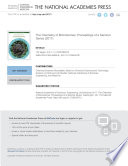

Most ebook files are in PDF format, so you can easily read them using various software such as Foxit Reader or directly on the Google Chrome browser.
Some ebook files are released by publishers in other formats such as .awz, .mobi, .epub, .fb2, etc. You may need to install specific software to read these formats on mobile/PC, such as Calibre.
Please read the tutorial at this link: https://ebookbell.com/faq
We offer FREE conversion to the popular formats you request; however, this may take some time. Therefore, right after payment, please email us, and we will try to provide the service as quickly as possible.
For some exceptional file formats or broken links (if any), please refrain from opening any disputes. Instead, email us first, and we will try to assist within a maximum of 6 hours.
EbookBell Team

0.0
0 reviewsThe National Academies of Sciences, Engineering, and Medicine's Chemical Sciences Roundtable organized a series of four seminars in the autumn of 2016 to explore the current advances, opportunities, and challenges toward unveiling this "chemical dark matter" and its role in the regulation and function of different ecosystems. The first three focused on specific ecosystems—earth, marine, and human—and the last on all microbiome systems. This publication summarizes the presentations and discussions from the seminars.